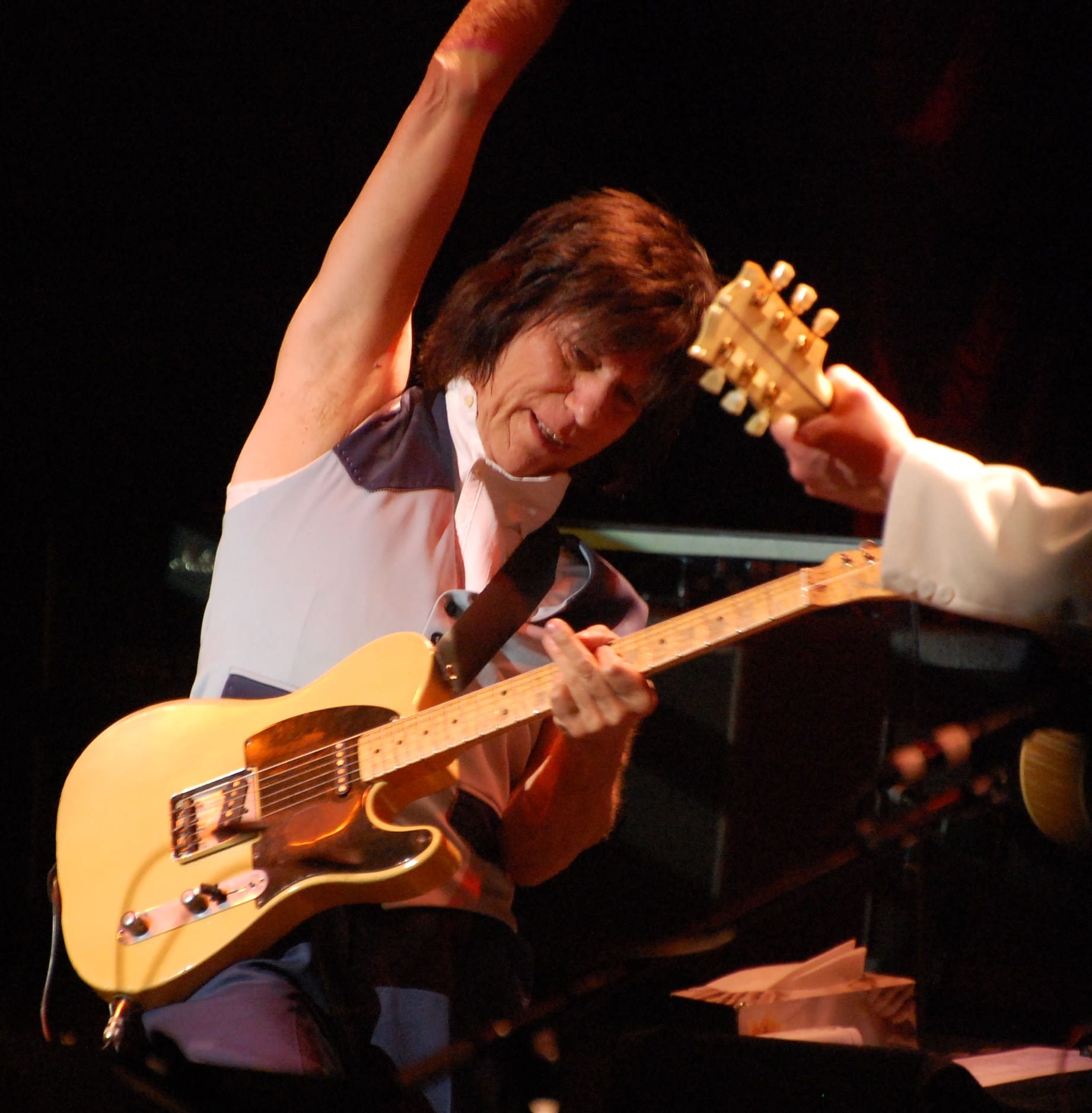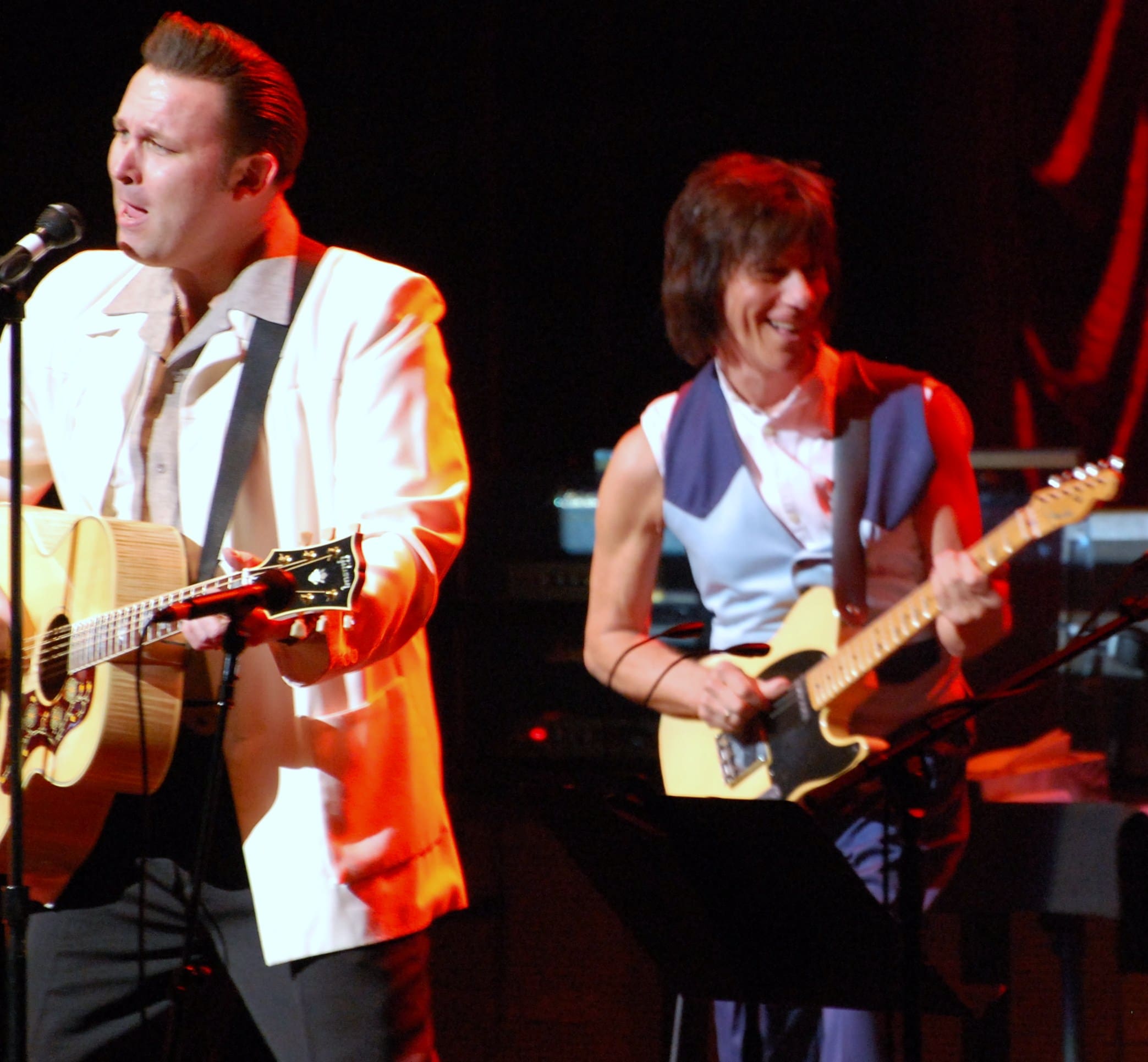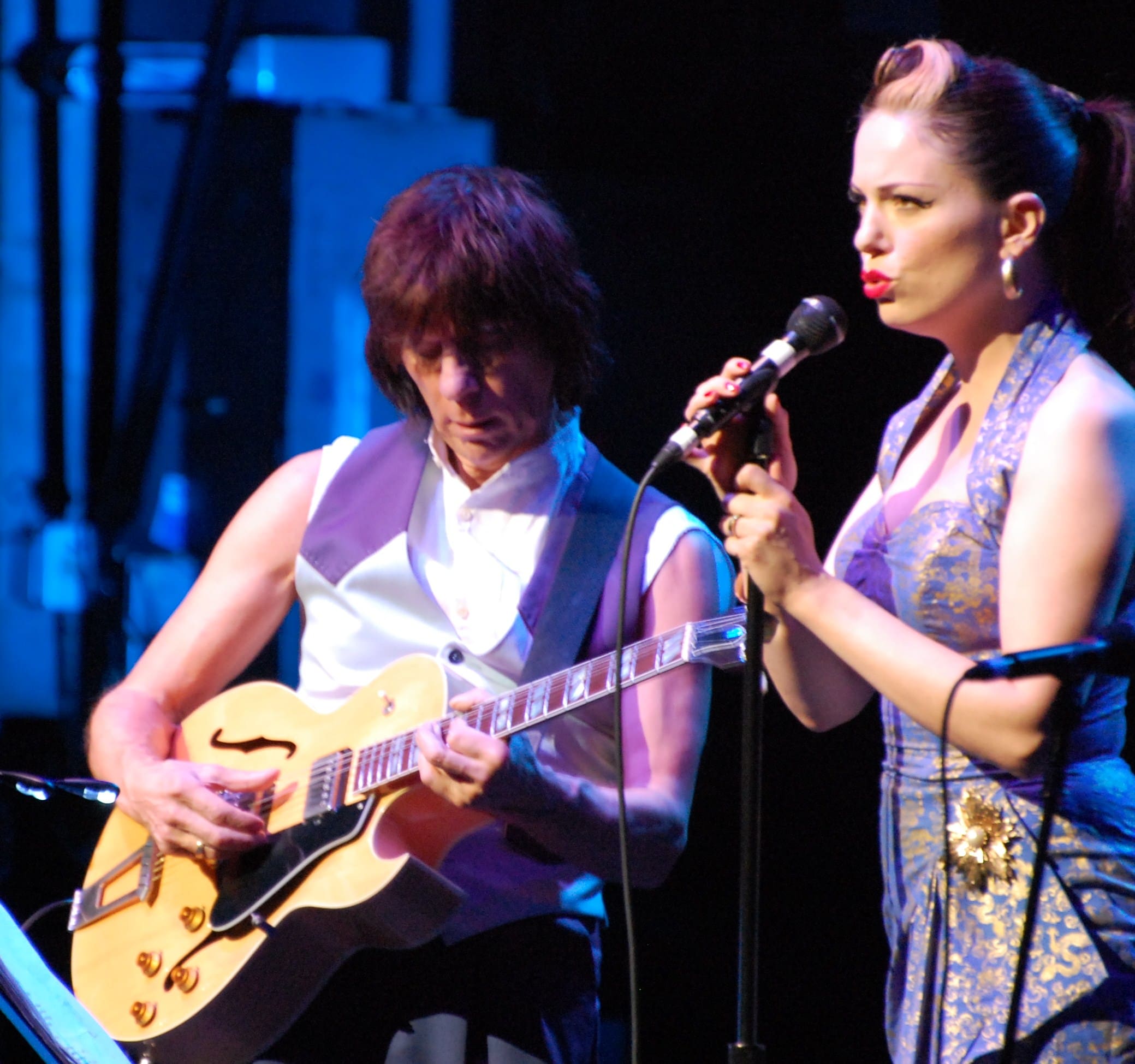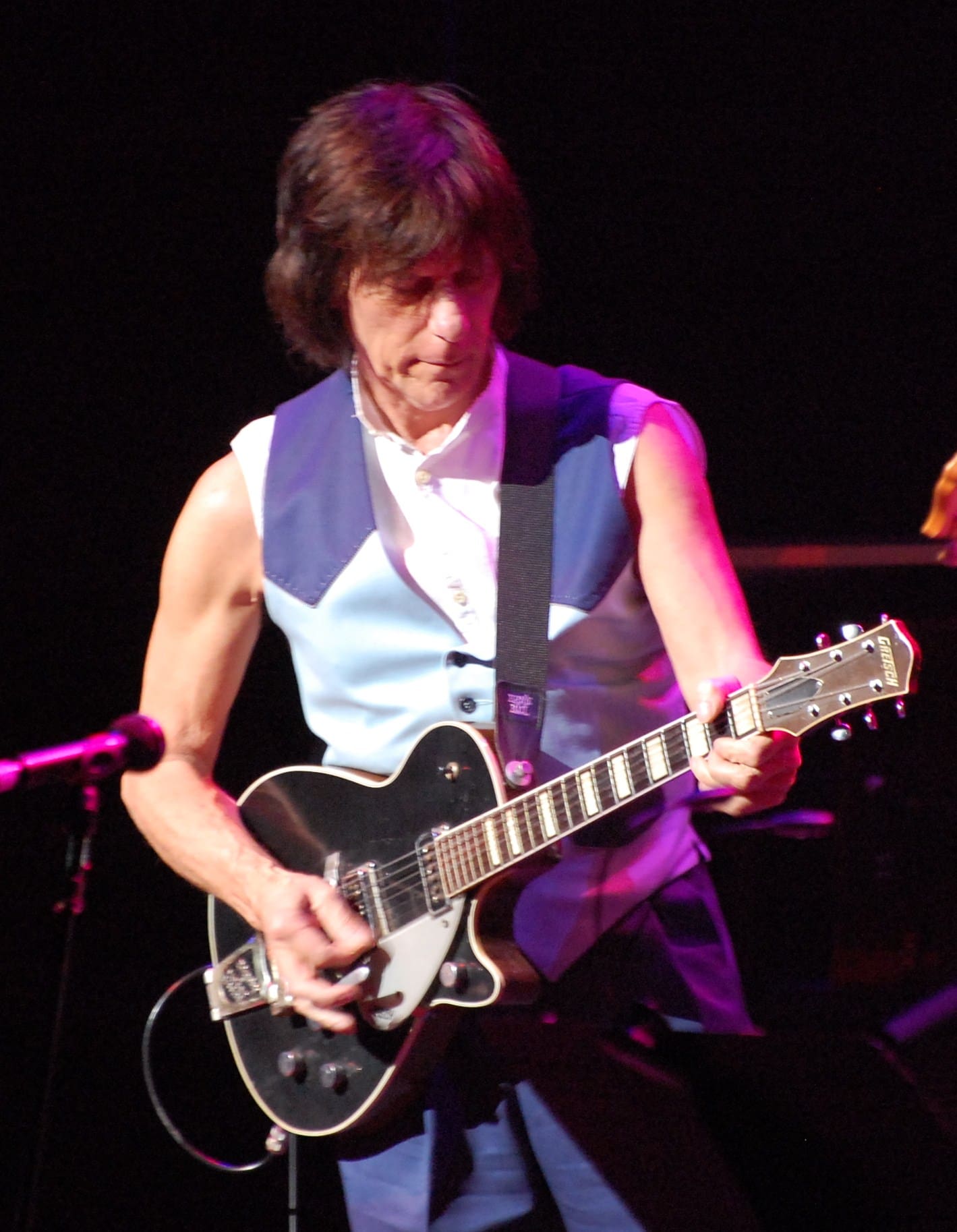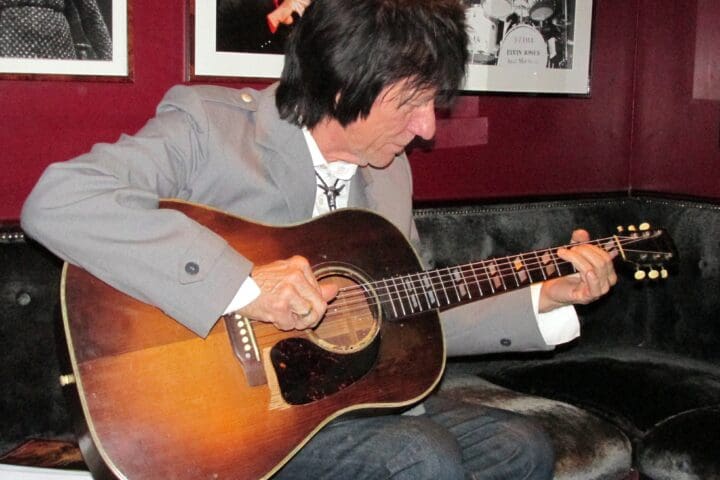“Actually, I did like the concert,” says my travel mate on the subway from New York’s upper west side to Times Square. I’d hopped the subway after seeing Jeff Beck brilliantly and humbly serve as sideman to Irish singer Imelda May and her band at New York City’s Beacon Theater. My ears perked when this fellow rider said to his companion, “You know, he plays stuff that no one else can play.” “So,” I asked, “were you at the Jeff Beck show at the Beacon?” When the fellow nodded, I asked if he had liked the concert. After pausing for a moment and looking to his companion, he looked back at me and conveyed begrudging approval.
In reluctantly endorsing the performance, my travel mate likely spoke for many of the theater’s capacity audience of 3,100. Beck can, indeed, play stuff no one else can play, and he has done so over the decades in a number of contexts. He’s always been out in front of the musical curve, from foreshadowing hard rock in the Yardbirds, to previewing heavy metal with the Jeff Beck Group, to inventing jazz-fusion with his first solo release, Blow by Blow. But, on this tour, labeled “Jeff’s Beck’s Rock and Roll Party,” the guitarist is looking backward rather than forward.
Moreover, Beck has eschewed the role of front man in favor of serving from stage right, where he rips note-perfect renditions of the solos of Cliff Gallup (with Gene Vincent), Scotty Moore (with Elvis), Danny Cedrone (on Bill Haley’s “Rock Around the Clock”), and other rockabilly pioneers. With whammy bar and volume knob, he perfectly emulates the slide guitar of the Santo & Johnny hit, “Sleep Walk.” At mid set, he and May perform a seven song ode to Les Paul and Mary Ford. It’s a stunning performance, as bravura as it is humble. And Beck’s range as a musician is breathtaking. He’s as comfortable playing Gallup’s angular lines as he is playing Moore’s country-inflected licks. For the 1950s, Arthur Hamilton-penned “Cry Me a River,” Beck plays delicate, straight ahead jazz chord-melody. During the Les Paul segment, he fingerpicks Les’s sped-up, speed-of-light, multi-tracked solos. At one point, singer May confesses to being so mesmerized by Beck’s playing that she loses track of when to come in with the backing vocals that she pre-recorded as did Mary Ford when she performed with Paul.
I simply cannot think of any musician but Beck who could pull this off. His performance is aided by the crisp backing band fronted by May’s sexy, snarling vocals. She croons, whispers, and screams. For the male vocals, Higham steps to the mic for convincing turns at Elvis or Gene Vincent. All the while, Beck smiles, fingerpicks away, and plays the sideman role to perfection. He even matches instruments to songs: a blonde Gibson ES-175 for early rockabilly and jazzy tunes, a Gretsch Duo-Jet for the Gene Vincent numbers, a Les Paul for, well, the Les Paul covers, a black ‘guard Telecaster for raucous songs like Tiny Bradshaw’s “Train Kept a Rollin’,” and his trusty Stratocaster for when he decides to work his tremolo and volume knob wizardry. It’s a virtuoso performance by any measure.
And the audience? At every quite moment, someone yields to the urge to scream for “Beck’s Bolero” or “Freeway Jam.” Mid-way through the seven-song Les Paul set, the gent next to me tells his companion, “I’m bored. I think I’m gonna go walk around,” and both walk out.
To be sure, not everyone is disconnected from the performance. Probably a majority of the audience recognizes that they are witnessing something extraordinary. But, when Higham announces seventy five minutes into the show that, “This next number will be our last tonight. We’re not getting any younger up here,” you know that Beck and crew can sense the discontentment.
Disappointed or not, the audience treats the performers to a standing ovation and when the musicians return, the drummer counts off a slow four-four and Beck and band launch into a scorching cover of the Shangri-Las 1964 hit, “Remember (Walkin’ in the Sand).” Beck’s Stratocaster screams and swoons as he finally does what the audience seeks. As he mixes the staccato with the legato, howling open string notes with pinched harmonics, and moves from whisper quiet to screeching, May comes shimmying out to offer her most impassioned vocal performance of the evening. Forty minutes and another standing ovation later, Beck and May close the evening with moving rendition of “Danny Boy.” When Beck falls to his knees and genuflects to May and she responds by shouting into the mic, “Jeff Beck, genius!” you know that they played for themselves as much as they played for their fickle audience. If you left your expectations at the theater door, not only might you have “actually” liked the concert, you likely left in awe of Mr. Beck’s musicianship and artistic vision.
You may not be able to please all of the people all of the time, but Jeff Beck has proven over four decades that he can challenge all of the people all of the time. He did so at the Beacon Theater to extraordinary artistic, if not popular success.
